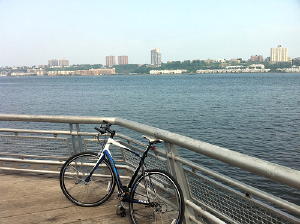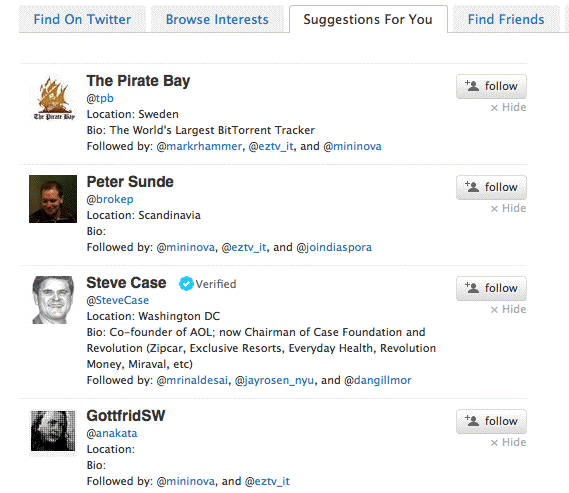
 OMG Twitter is down arrrgh helllp whimper sob
OMG Twitter is down arrrgh helllp whimper sob 
 We are so pathetic, addicted to Twitter, yet helpless to do anything about it when it goes down. This is what the Internet comes to.
We are so pathetic, addicted to Twitter, yet helpless to do anything about it when it goes down. This is what the Internet comes to.
Make a movie about it. "Great acting, unbelievable plot," writes AO Scott in the NY Times. The human race goes down in flames. When aliens discover the ruins of our civilization it turns out Twitter went down and never came back. All the iconography in our churches replaced with images of whales and cute blue birds.
 Lunch with NakedJen
Lunch with NakedJen 
I had lunch today with NakedJen at Veselka.
We had sauerkraut and mushroom perogies (boiled), borscht, ice tea and I had a curry chicken salad. It was all delicious esp the perogies!
We also went on a ride on the Staten Island Ferry, and pretended it was the ferry between Helsingor, Denmark and Helsingborg, Sweden.
It's always great to see NJ, after a few minutes of clowning around it's like I see her every day, which unfortunately I don't.
Here's something really funny. I took a picture in the ferry terminal in Halsingbord, Sweden in 2007, and posted it as "Here's one for Naked Jen." The mind works in funny ways. Insanely funny. She even commented on one of the pictures I took.
She's in town for BlogHer.
PS: If you ever meet NakedJen the first thing you'll notice is how short she is. She has a huuuuuge personality, that's why it's so surprising that she's so tiny.
PPS: Science bloggers take note. Pepsico is one of BlogHer's sponsors. Last year she got kicked out of the conference because she gave them a hard time for the ways they're screwing up the planet. To BlogHer's credit, she's back this year as their "green" adviser.
 Daily bike ride 3.0
Daily bike ride 3.0 
Added 14 blocks to my round-trip today, got up to 71st on the Greenway.
My legs never stopped hurting the whole trip, so I think tomorrow is a day of rest. But I already feel big changes in my body. My pants are looser, I feel much stronger, I'm looking for more fruit and less fat in my diet. These things just happen automatically even just as you're starting to work out.
Also each trip gives me something new to find out about. There are concerts on Pier 1, it's in a beautiful spot. Also cruise ships dock in the 50s or 60s (not sure). They are huge. Today there were people returning from a long cruise (based on the amount of luggage they were carrying).
I'm still learning how to ride in NYC. Going the wrong way in bike lanes is not a great idea. Pedestrians don't watch for bikes and when you say Watch Out they get angry at least sometimes. ![]()
 Better recommendations from Twitter
Better recommendations from Twitter 
This morning they turned back on recommendations and instead of just getting the usual Suggested Users List fare, now they're recommending some interesting people.
I imagine they're not just looking at who I follow but also looking at the content of my tweets. I tend to post links to stories about BitTorrent, because I'm very interested in the protocol.
 How to boot a federated social network, now
How to boot a federated social network, now 
 The thing we've always needed and didn't have is a place to get a user id and password that wasn't owned by a big company and was still as simple for the user as the ones operated by the big companies.
The thing we've always needed and didn't have is a place to get a user id and password that wasn't owned by a big company and was still as simple for the user as the ones operated by the big companies.
Ponder that for a moment, and imagine what would happen in the app space if each developer could count on say 10MB per user of storage, enough for a lot of pointers into space managed elsewhere. Sort of like what Twitter was planning with annotations, but not owned by Twitter.
And stop there. Identity with a small amount of storage. The API should be DNS. We need to make it easy for people to get their own domain for life. We could even come up with a new TLD for it, somthing like dot-id. davewiner.id. That would be me.
It is too hard to get a domain these days through GoDaddy et al, so let's make it easier. There's no reason you can't make getting a domain as easy as getting a Facebook or Twitter account.
If we want to get some help from Verisign, I know some people there. Did a deal with them a few years ago. I like them, a lot. ![]()
As far as the format for the streams -- that's simple too. It's going to be any of the variants of RSS that people want to use: 0.91, 1.0, 2.0 or Atom 1.0. People who say it has to be one and not the others are dreaming. If we need to add some info, come up with a namespace. You tell me what you want to do and I'll do it.
Now we need to get some money to operate the DNS and storage for this network. For that we're going to look to the VCs. We need to raise an endowment of $25 million which we'll entrust to a consortium of five universities. I'd like to see NYU be one of them, of course. The universities will operate this name and storage system, forever. The consortium will charge users a fee, the same way Verisign does, and thus the identity system will be funded for the indefinite future.
Why universities? Well, we need what they have: Neutrality and longevity. Also, there's a tradition of university consortia doing good work of this kind. The Internet itself was founded in this way. We also need youth and education. If this is created by the generation that's in school now, when they come out in a few years, they'll be ready to kick ass. They'll have something to be proud of.
Now we have created a commons that makes it possible for a million flowers to bloom. And it gives the BigCo's a field on which to do their battles without doing any lasting damage to the ecosystem.
I've argued with my VC friends for a long time that they need to put back to replace what they take out of the pool of innovation. Now is their chance to do that. The PR will be very good of course, but even better are the opportunities this system will create for new startups. Put it another way, ask some of your entrepreneurs how much innovation is waiting for such a system to exist. I'm sure they will tell you it's enormous.
 Why didn't Google Wave boot up?
Why didn't Google Wave boot up? 
 I specialize in the kind of software that Google Wave is. Blogging is an example. So is RSS and podcasting -- those were the successes. I also started a BBS in the early 80s that worked.
I specialize in the kind of software that Google Wave is. Blogging is an example. So is RSS and podcasting -- those were the successes. I also started a BBS in the early 80s that worked.
For all that success, there have been many more failures. For example I've been trying to boot up a network based on Instant Outlining for almost a decade. Longer, if you count work I did going back to the 80s at Living Videotext. So far, it hasn't gained traction. Still hunting for the magic formula.
So there's no shame, as far as I'm concerned, in trying to launch a network of computer users, and having it not boot up.
So why didn't Google Wave happen?
Here's the problem -- when I signed on to Wave, I didn't see anything interesting. It was up to me, the user, to figure out how to sell it. But I didn't understand what it was, or what its capabilities were, and I was busy, always. Even so I would have put the time in if it looked interesting, but it didn't.
However, it had another problem. Even if there were incentives to put time into it, and even if I understood how it worked or even what it did, it still wouldn't have booted up because of the invite-only thing. It's the same problem every Twitter-would-be or Facebook-like thing has. My friends aren't here, so who do I communicate with? But with Wave it was even worse because even if I loved Wave and wanted everyone to use it, it was invite-only. So the best evangelist would still have to plead with Google to add all of his workgroup members to the invite list. The larger your workgroup the more begging you have to do. This is exactly the opposite of how you want it to work if you're in Google's shoes.
I assume they were worried about how the system would perform if they got too many users. It's as if, starting a baseball season, you worry about where you're going to put the World Series trophy. It's not something you need to worry about. You might even say you jinx your prospects for success if you put that in the front of your mind.
Anyway, Google Wave was tilted in the wrong direction.
1. Hard to understand.
2. Nothing happening.
3. My friends aren't there.
4. Even if they wanted to come, I'd have to get them invites. (I did have a certain number of invites to give to my friends, but not enough to let me broadcast about it on my blog.)
5. Why should I bother?
When I started using Twitter, it was:
1. Easy to understand.
2. There was stuff already happening.
3. Most of my friends weren't there, but some were. (Notably Ross Mayfield, who was pushing hard for people to join.)
4. Anyone could join, you didn't need an invite.
5. No reason for me to bother, as with Wave, I was just a user. But I couldn't help but write about what I was doing, I'm a NBB, that's what I do.
Moral of the story...
1. Before you roll out a community-based product, use it yourself to inform a modest community of users. Hopefully a small one, that loves you and the product, so they'll keep coming back even if they don't get what it does. Until you gain traction at that level, don't go any further.
2. Something is happening (see step 1), make sure every new user sees it. Every step before seeing the action is a chance for them not to get it, so get them there right away.
3. Their friends probably aren't there. Fact of life, nothing to be done about that.
So even if everything is right, the net might not boot up. That's way these things go. Try again, if you still think there's something there. It could the time isn't right. It took three or four launches before podcasting booted up. There were lots of community blogging sites before Blogger took off. Sometimes it's just the timing.
BTW, to see what users are willing to do to get an invite, check out this video






